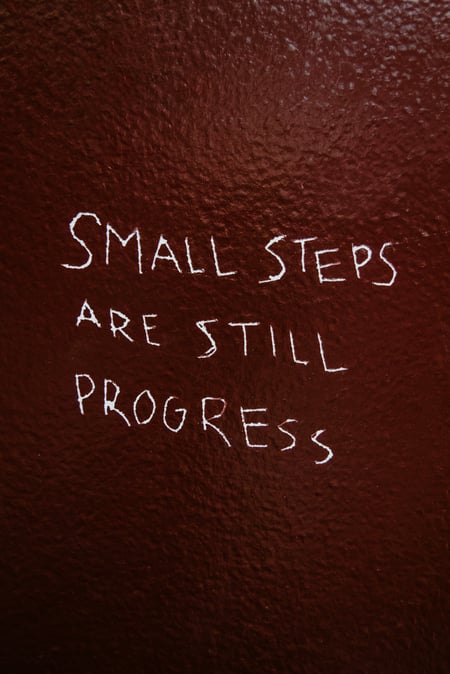
Photo by Amanda Jones on Unsplash
“New year, new me!” has always troubled me as a concept. This notion that the clock strikes midnight on 31st December and you experience the kind of existential epiphany that catapults you into a life of zen and perfection doesn’t sit well. Jan 1st might seem like a good day to “start new” (particularly for specific goals like quitting smoking), but research suggests that many New Year’s resolutions fail, so realistically any day of the year has just as much potential. The word “resolution” also carries connotations of finding solutions to problems – do you really want to see your life as a problem to be solved when it could be a work in progress instead?
Another issue, of course, is that the start of a new year offers the temptation to commit things to the past, particularly times of stress and hardship; you would certainly be forgiven for having been more than ready to close the book on 2020! The reality for leaders is, though, that tough times (even when we may feel we’re failing) teach us so much and give us the opportunity to reframe our perspective on what we’ve been through, take stock and choose what to take forward from each experience.

Photo by Tuesday Temptation on Unsplash
That said, this kind of continuous improvement does take work, and an essential element is personal resilience. It’s easy to think that resilience simply equals strength, when in fact it has more to do with developing thought and behavioural processes which will not only strengthen you during tough times, but also help you bounce back with ease, ready for the next challenge. If, like me, you’re ditching the resolutions and committing instead to staying curious and achieving a growth mindset, here are some things to remember:
1. Put on your own oxygen mask first. It’s a simple instruction that air passengers have heard many times, but this analogy is apt for leaders who want to build resilience because it reminds us that, in high-stress situations, it’s easy to default to support mode and prioritise others. The reality is, though, that you can’t help others without first helping yourself. Taking the example further, being mindful of fundamental needs such as oxygen will lead you to ask, “Have I eaten today?”, “Am I getting enough sleep?”, “When did I last take a break and drink some water?” Even the devices we rely upon so heavily don’t have unlimited resources; sure, you can put them into power-saving mode, but without a recharge they will inevitably switch off. It’s not selfish to put yourself first, it will put you in a better position to lead and support and help you avoid burnout.
2. Accept what you cannot change. The past twelve months have demonstrated beyond doubt that some things are simply outside of our control. This can be a challenging concept for leaders, for some of whom control (for example in the form of budgets and reports) brings a degree of comfort. What happens, though, when everything is blown out of the water? Few of us could have predicted that the world would be turned on its head by Coronavirus, and at the beginning you may have had thoughts along the lines of, “If I just hang on, things will go back to normal and I won’t have to adapt.” Those who’ve pursued that train of thought, however, have found that ignorance is in fact not bliss and are likely to have felt completely overwhelmed. As Jung noted, “What you resist not only persists, but will grow in size” and we know that we cannot bury our heads in the sand. Therefore, building resilience as a leader requires us to exercise radical acceptance – this does not mean you approve of the situation, but instead that you are willing to focus the energy you may once have used to resist or ignore the status quo on remaining flexible and meeting challenges head-on.

Photo by Sydney Rae on Unsplash
3. Actions speak louder than words. Developing your own resilience is about so much more than talking the talk, and not following through with actions has the potential to damage the shadow you cast as a leader. People take cues from what you do, not what you say, and there is little room for hypocrisy when it comes to demonstrating resilience. For example, if you are telling your people that personal wellbeing is important, but they see you burning the candle at both ends, why should they trust your words? If you are committed to following through on the principles of resilience via your actions, you will become a better role model and perhaps inspire those around you to work on their own resilience in turn, all the while improving your own ability to cope and thrive during challenging times.
4. Nobody is an island. The urge to retreat within ourselves when everything around us seems overwhelming is a perfectly normal reaction, but the most resilient among us know that we cannot get through crises alone. The Covid pandemic has established new levels of humanity in leadership and has also served to remind us that it’s ok to need help from others. You can be committed to your own resilience, but also draw on that of others; as the saying goes, “A problem shared is a problem halved.” Discussing what you are dealing with, what is causing you concern and how you feel about it goes a very long way towards shifting your mindset and creating a more constructive headspace from which to overcome the challenge at hand. Asking trusted people for their thoughts and experiences helps you see things from a different perspective and often sheds light on new ideas, so don’t be afraid to reach out to others. At the end of the day, we are all in this together.
 Photo by Hayley Catherine on Unsplash
Photo by Hayley Catherine on Unsplash
5. Progress, not perfection. This may be difficult to swallow, but none of us are perfect. Becoming more resilient may convince you that you can handle anything, but the truth is that you will still have bad days and negative thoughts, and you may well have to fight the urge to have a full-on tantrum because “it’s not fair!” Part of building resilience in leadership is accepting this, but also understanding that how you feel impacts how you behave as a leader; it is far better to voice how you are feeling than to internalise it and risk projecting your fear/resentment/frustration onto your people. By speaking up and acknowledging that resilience is a continuous effort/work in progress, you will create a space of psychological safety for yourself and your team and demonstrate that it’s ok not to be ok.
All things considered, it’s clear to see that resilience isn’t about being bulletproof, nor does it mean having all the answers all the time. To become a more resilient leader you must first be able to accept that “it is what it is” and have the courage to weather the storm, staying open-minded, authentic and flexible. It’s so much more than a simple resolution to do or not to do something; it’s a commitment to doing your best and learning from the things that go wrong. So, forgive yourself if Dry January or PE with Joe Wicks haven’t quite gone to plan, and remember what Caitlin Jenner says – tomorrow is “just another day to excel!”
